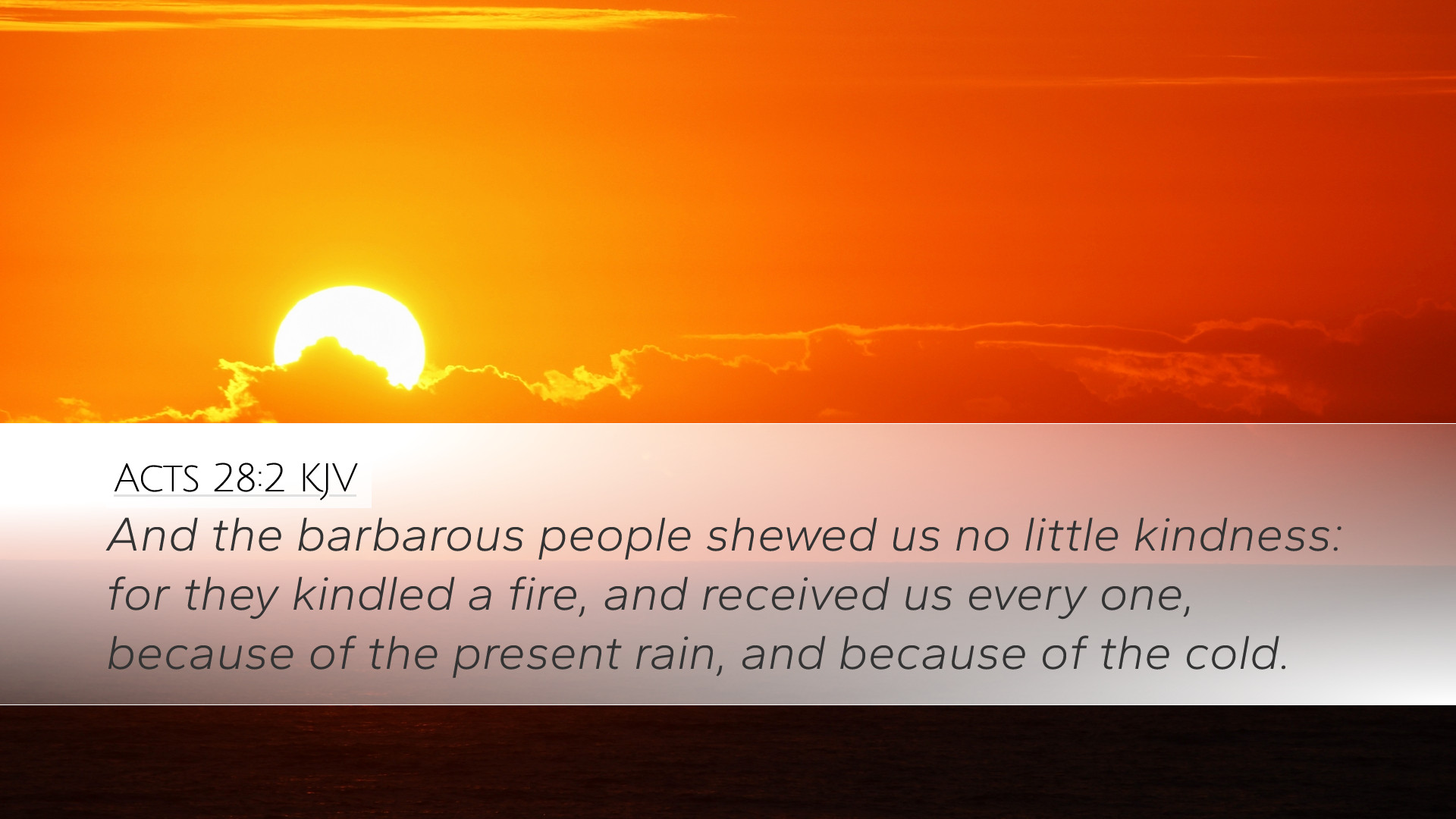Commentary on Acts 28:2
Verse: "And the barbarous people showed us no little kindness: for they kindled a fire, and received us every one, because of the present rain, and because of the cold."
Introduction
This verse comes at the conclusion of the Apostle Paul's long journey to Rome, a voyage marked by shipwreck, peril, and divine providence. His arrival on the island of Malta (referred to as Melita in some translations) showcases a profound example of God’s care and the unexpected kindness of strangers. The contrast between Paul’s hardships and the compassion of the Maltese provides a rich ground for theological reflection.
The Character of the People
The inhabitants of Malta are described as "barbarous," a term that in this context indicates that they were non-Greek speakers, likely implying a cultural and linguistic distinction rather than moral depravity. Matthew Henry notes that despite their designation as barbarians, they exhibited remarkable kindness and hospitality to Paul and his companions, displaying the common humanity that transcends cultural boundaries.
Insights from Matthew Henry
- Hospitality in Adversity: Henry emphasizes the significance of the Maltese people's kindness during a crisis. Their timely assistance with fire and shelter at a moment of vulnerability illustrates a powerful act of grace in a world often fraught with hostility.
- Grace Manifested: He points out that divine providence often works through the kindness of people who, despite their cultural background, embody the principles of compassion and mercy that unify humanity.
Theological Reflections
Acts 28:2 encourages readers to consider the nature of kindness and its divine origins. The actions of the Maltese reflect a natural inclination towards compassion that can be understood as a reflection of God's character. They provide a vivid illustration of how grace can manifest in unexpected ways and places, reminding us of God's providential care.
Albert Barnes' Commentary
- Kindness of the Maltese: Barnes remarks that the kindness shown to Paul and others can be seen as a divine appointment. Their actions serve to highlight God's plan to sustain His servant even amid adversity.
- Principle of Reciprocity: Barnes also discusses the biblical principle of reciprocity in kindness, where the care extended to Paul can be viewed as a foreshadowing of the blessings that come from selfless acts in the lives of believers.
Practical Applications for Believers
The narrative in Acts 28:2 encourages believers to seek out and extend kindness in their daily lives. It is a call to action for the Church to embody the love of Christ, providing support and comfort to those around us, particularly during their moments of crisis. The story models how to be the hands and feet of Jesus in a world that often feels cold and indifferent.
Adam Clarke's Insights
- Importance of Community: Clarke brings forth the idea that community emerges strongest during trials. The unity shared by the shipwrecked crew and the Maltese serves as a testament to the human spirit's resilience and the necessity of communal support.
- Divine Timing: He highlights the significance of God's timing in our lives. The arrival of Paul, drenched and likely weary, at the moment when the Maltese were prepared to help, speaks volumes about the divine orchestration that often goes unnoticed.
Concluding Thoughts
Acts 28:2 serves as a reminder that in our darkest hours, God often provides unexpected sources of comfort and refuge. The kindness of the Maltese people illustrates that God's goodness can shine through the most unlikely individuals. As believers, we are called to reflect this love and kindness in our own lives, creating a ripple effect that can impact our communities profoundly.


